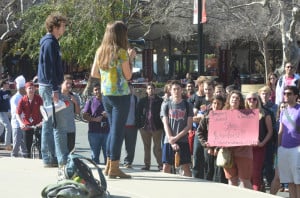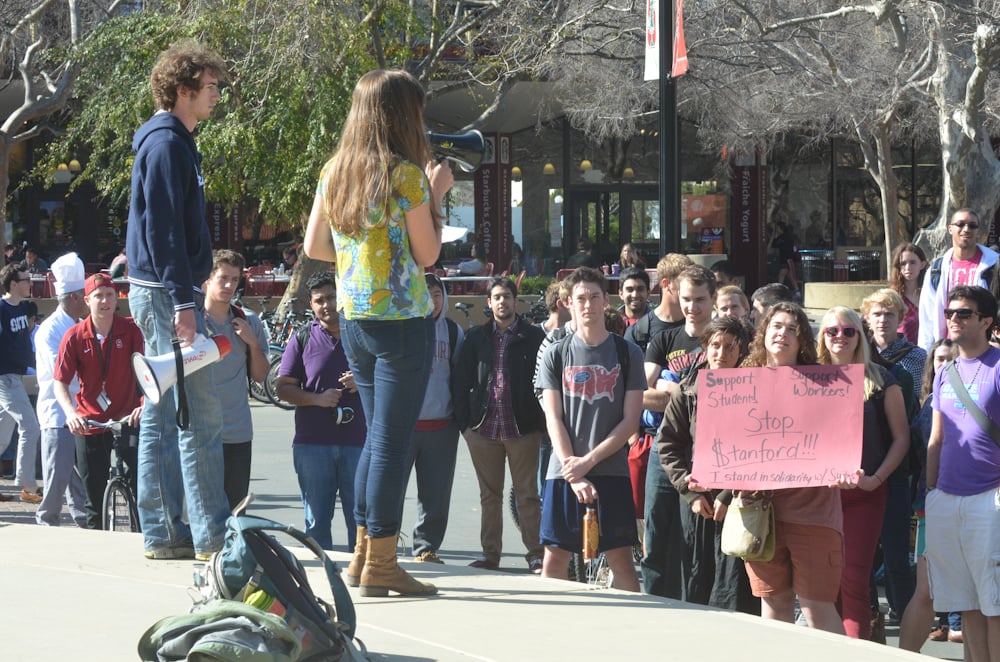
The Stanford Student Freedom Project (SSFP), a new advocacy group composed of more than 80 students and alumni focused on protecting student liberties, endorsed six Senate candidates, three class president slates and both serious Executive slates for this year’s ASSU elections.
According to Miles Unterreiner ’12 M.A.’13, a Daily staffer, and Maayan Dembo ’14, two of the project’s leaders, SSFP aims to be more than just an endorsement group, focusing principally on promoting an increased recognition of student voices in administrative decisions.
Unterreiner and Dembo cited several recent incidents—such as the termination of Chi Theta Chi’s lease, the decision to ban Net Appetit from campus and Residential Education (ResEd)’s plan to contract Suites dining management to an outside vendor—as demonstrative of violated student freedoms.
“We happened to be founded right before elections so our first project is endorsements, but we foresee the Freedom Project continuing,” Unterreiner said. “For this year, the big objective is Suites and seeing that brought to a satisfactory conclusion.”
Dembo said that SSFP received applications from both Executive slates, eight Senate candidates and approximately two class president slates from each class.
All candidates were required to fill out SSFP’s application, which included questions about what other endorsements they received, why they chose to run for office, how they felt about the Suites controversy and how they planned to advance the cause of student freedom if elected.
“Knowing personally several of the candidates and having read their applications, I think that next year is going to be a very good year,” Unterreiner said. “We are looking forward to having a really energetic, powerful student government that really advocates for student interests, and I think the likelihood is high that that is going to happen.”
A panel of six SSFP members, including Unterreiner and Dembo, reviewed the applications and interviewed the Executive slates before making endorsement decisions.
Though Unterreiner wrote on April 1 that SSFP would endorse one Executive slate, the group endorsed both Dan Ashton ’14 and Billy Gallagher ’14, and Najla Gomez ’14 and Elizabeth Patiño ’14.
Unterreiner said that deciding between the two Executive slates was like “comparing apples and oranges,” as the committee was impressed by Gallagher and Ashton’s focus on independent journalism and holding the administration accountable, but also by Gomez and Patiño’s experience in social and political organizations.
“We genuinely felt that [both slates] would both be equally effective, but that their styles and methods of going about being effective would be very different,” Unterreiner said. “Whatever choice students make for Executive next Friday, they have made the right choice. You really can’t lose. Whoever wins is going to do a fantastic job.”
Sophomore class president slate SophServe, junior class president slate take15 and senior class president slate SenYOUR Time also received the SSFP’s endorsement. Dembo said that the committee was particularly impressed by SophServe’s plan to look into the closure of the Toyon Eating Clubs, which were shut down in 2009.
“Even though they are class presidents, and they don’t have that much instated power in their position, they are still taking advantage of their position as a leader and trying to help us out,” Dembo said about SophServe.
SSFP also endorsed six Senate candidates: Ben Holston ’15, Hisham Al-Falih ’16, Abby Dow ’16, Ryan Matsumoto ’16, Ilya Mouzykantskii ’16 and Natasha Patel ’16.
Both Dembo and Unterreiner expressed enthusiasm about specific initiatives proposed by these candidates, such as Patel’s idea to hold students accountable for their work in University committees. Patel said that she applied for the SSFP endorsement because the group’s goals aligned with her plans for the Senate, if she is elected.
“A lot of what I want to see is getting the student body really to interact, and I think the Stanford Student Freedom Project does a really good job of that through their mission,” Patel said. “People who are freshmen or sophomores, who are not considered upperclassmen, can still take part in these issues that upperclassmen see as faulty and want to see changed.”
Unterreiner and Dembo agreed that underclassmen senators should be able to represent SSFP’s interests, despite the fact that most have limited experience with many of the issues that SSFP is currently focusing on.
Dembo said that the SSFP will regularly check in with their endorsees to advise them on making decisions and pursuing projects during their terms in the ASSU.
“I plan on putting a lot of pressure on the students that we have endorsed to actually fulfill a lot of the things they talked about in their platforms, and make sure that they are keeping their promises,” Dembo said.
Though Unterreiner and Dembo credited several senators, notably Viraj Bindra ’15, for showing interest in the Suites controversy, they expressed frustration with the current Senate’s inaction in terms of student life initiatives.
Vice Provost for Student Affairs Greg Boardman said that the ASSU, and in particular the Senate, has traditionally remained uninvolved in conflicts between students and the administration regarding student freedom.
“The ASSU is currently much more focused on student organizations than these other areas,” Boardman said. “Sometimes the ASSU gets involved, sometimes not so much.”
However, Boardman said that members of the ASSU are “welcome to join in on any of the conversations,” and expressed optimism that future senators, class presidents and Executives would take part in discussions about promoting student voices in administrative decision-making.
Unterreiner agreed with Boardman’s characterization of the ASSU’s historical inaction with regards to student freedom issues, but said he believes that the trend can be reversed with this year’s election.
“If we manage to endorse and successfully elect candidates who really are energetic and passionate and want to utilize the power of the Senate to the fullest, I think we could help bring back the ASSU from the student-imposed irrelevance that it has assumed,” Unterreiner said.
